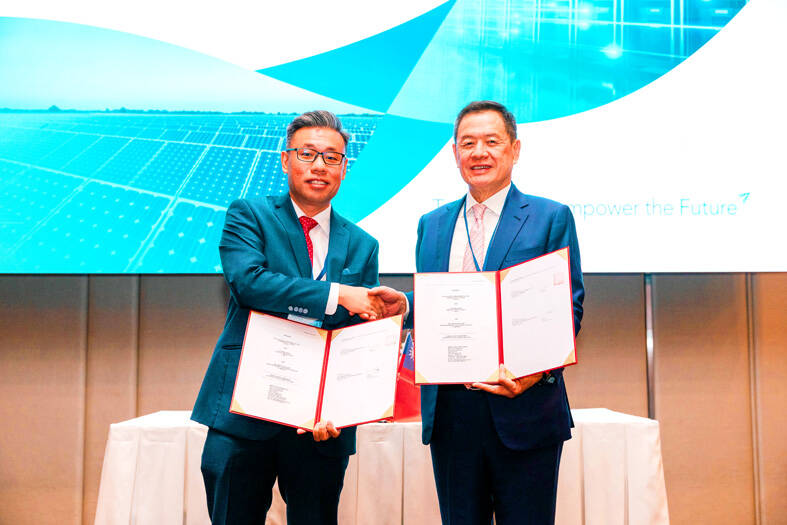Teco Electric and Machinery Co Ltd (東元電機) has signed an agreement to acquire Malaysia’s mechanical, electrical and plumbing (MEP) engineering company NCL Energy Sdn Bhd, as the Taiwanese industrial motor manufacturer pursues booming opportunities in the Southeast Asian country’s data center and renewable energy markets.
Teco plans to acquire an 80 percent stake in NCL, becoming its largest shareholder, the company said in a statement yesterday.
Together with a proposed investment in NCL’s renewable energy subsidiary, NCL Green Energy Sdn Bhd, the deal would total up to 70 million ringgit (US$15.8 million), Teco said.

Photo courtesy of Teco Electric & Machinery Co
The transaction is expected to be completed in the second quarter of this year, the company said.
Teco’s board of directors approved the acquisition and investment plans on Friday last week, and the company held a signing ceremony in Kuala Lumpur yesterday.
“With its low electricity costs, vast land availability and strategic location near Singapore, Malaysia has attracted significant investment in data center construction, making it the country with the highest number of new data centers in Southeast Asia,” Teco chairman Morris Li (利明献) said in the statement.
Entering Malaysia’s data center MEP engineering market is just the first step, as Teco plans to expand into solar power plant, battery energy storage system, electric vehicle charging and MEP equipment sales to seize growing market opportunities there, he said.
NCL has been engaged in MEP and solar engineering in Malaysia for nearly 20 years, Teco said.
Teco has also established a strong working relationship with NCL on two hyperscale data center projects recently, the company added.
Malaysia is gearing up to become a major player in the global semiconductor industry after signing a major deal with UK chip giant Arm Holdings PLC on March 5, aiming to move into more value-added production, such as chip fabrication and integrated circuit (IC) design, from back-end IC packaging in the next five to seven years.
In addition, Malaysia has attracted sizeable investments from global tech giants such as Google, Microsoft Corp, Amazon.com Inc’s Amazon Web Services Inc and Oracle Corp in the data center area, as the country looks to position itself as Southeast Asia’s data center hub in the next few years.
Against this backdrop, the NCL deal aligns with Teco’s strategy of increasing overseas revenue to more than 50 percent within the next two to three years by targeting Southeast Asia’s high-growth potential markets, the company said.

TARIFFS: The global ‘panic atmosphere remains strong,’ and foreign investors have continued to sell their holdings since the start of the year, the Ministry of Finance said The government yesterday authorized the activation of its NT$500 billion (US$15.15 billion) National Stabilization Fund (NSF) to prop up the local stock market after two days of sharp falls in reaction to US President Donald Trump’s new import tariffs. The Ministry of Finance said in a statement after the market close that the steering committee of the fund had been given the go-ahead to intervene in the market to bolster Taiwanese shares in a time of crisis. The fund has been authorized to use its assets “to carry out market stabilization tasks as appropriate to maintain the stability of Taiwan’s

STEEP DECLINE: Yesterday’s drop was the third-steepest in its history, the steepest being Monday’s drop in the wake of the tariff announcement on Wednesday last week Taiwanese stocks continued their heavy sell-off yesterday, as concerns over US tariffs and unwinding of leveraged bets weighed on the market. The benchmark TAIEX plunged 1,068.19 points, or 5.79 percent, to 17,391.76, notching the biggest drop among Asian peers as it hit a 15-month low. The decline came even after the government on late Tuesday authorized the NT$500 billion (US$15.2 billion) National Stabilization Fund (國安基金) to step in to buoy the market amid investors’ worries over tariffs imposed by US President Donald Trump. Yesterday’s decline was the third-steepest in its history, trailing only the declines of 2,065.87 points on Monday and

TARIFF CONCERNS: The chipmaker cited global uncertainty from US tariffs and a weakening economic outlook, but said its Singapore expansion remains on track Vanguard International Semiconductor Corp (世界先進), a foundry service provider specializing in producing power management and display driver chips, yesterday withdrew its full-year revenue projection of moderate growth for this year, as escalating US tariff tensions raised uncertainty and concern about a potential economic recession. The Hsinchu-based chipmaker in February said revenues this year would grow mildly from last year based on improving supply chain inventory levels and market demand. At the time, it also anticipated gradual quarter revenue growth. However, the US’ sweeping tariff policy has upended the industry’s supply chains and weakened economic prospects for the world economy, it said. “Now

An employment discrimination lawsuit against contract chipmaker Taiwan Semiconductor Manufacturing Co (TSMC, 台積電) might soon be expanded after a hearing in a federal court in San Jose, California, on Tuesday to add 15 plaintiffs to the case. According to a court document, the lawsuit, which was refiled in November last year as a form of a class action with 13 plaintiffs in California, wants to add 15 plaintiffs from Arizona, where TSMC is building up its wafer fab capacity. TSMC first committed between 2020 and last year to invest US$65 billion in three advanced wafer fabs in Arizona. It then pledged an